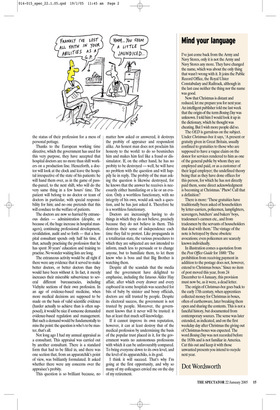Mind your language
I’ve just come back from the Army and Navy Stores, only it is not the Army and Navy Stores any more. They have changed the name, which was about the only thing that wasn’t wrong with it. It joins the Public Record Office, the Royal Ulster Constabulary and Railtrack, although in the last case neither the thing nor the name was good.
Now that Christmas is distant and reduced, let me prepare you for next year. An intelligent publisher told me last week that the origin of the term Boxing Day was unknown. I told him I would look it up in the dictionary, which he thought was cheating. But I wish more people did so.
The OED is garrulous on the subject. Under Christmas-box it says, ‘A present or gratuity given in Great Britain, usually confined to gratuities to those who are supposed to have a vague claim on the donor for services rendered to him as one of the general public by whom they are employed and paid, or as a customer of their legal employer; the undefined theory being that as they have done offices for this person, for which he has not directly paid them, some direct acknowledgment is becoming at Christmas.’ Phew! Call that a definition?
There is more: ‘These gratuities have traditionally been asked of householders by letter-carriers, policemen, lamplighters, scavengers, butchers’ and bakers’ boys, tradesmen’s carmen etc., and from tradesmen by the servants of householders that deal with them.’ The vintage of the note is betrayed by these obsolete avocations; even policemen are scarcely known individually.
In illustration comes a quotation from the Post Office Guide for 1880: ‘The prohibition from receiving payment in addition to the postage does not, however, extend to Christmas boxes.’ Since no item of post moved this year, from 24 December to 4 January, this provision must now be, as it were, a dead letter.
The origin of Christmas-box goes back to the early 17th century, when apprentices collected money for Christmas in boxes, often of earthenware, later breaking them open and sharing the contents. This is not a fanciful history, but documented from contemporary sources. The sense was later extended, as indicated, and on the first weekday day after Christmas the giving out of Christmas-boxes was expected. The word Boxing Day was not recorded before the 1830s and is not familiar in America. Cut this out and keep it with those unwanted presents you intend to recycle next year.
Dot Wordsworth













































 Previous page
Previous page